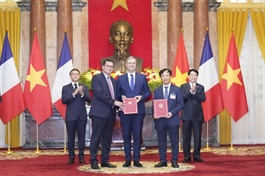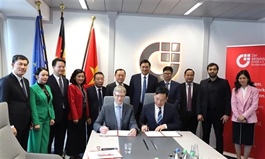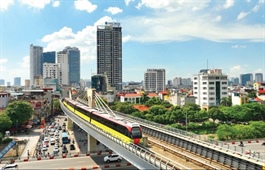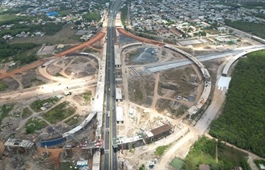Private sector seen as key driver of Việt Nam’s economy
Private sector seen as key driver of Việt Nam’s economy
Reducing business conditions, streamlining administrative procedures and lowering compliance costs could be achieved by shifting from pre-inspection to post-inspection.

Workers at a dry food company in the southern province of Đồng Tháp. VNA/VNS Photo Nhựt An |
The private sector will play a crucial part in national and economic development, participants at a special conference in Hà Nội yesterday were told.
Speaking at the conference’s opening, Associate Professor Dr Nguyễn Trọng Điều, President of the Vietnam Association of Private Entrepreneurs, discussed the implementation of Resolution No. 68-NQ/TW (Resolution 68), which was issued by the Politburo on May 4, 2025.
The resolution, aimed at unlocking private capital and changing mindsets, is of special significance and should be seen as a historic breakthrough, a milestone in both development thinking and national governance.
“Amid the optimism shared by entrepreneurs, academics and policymakers alike, Resolution 68 has been hailed as a rallying call, not just for the private economy, but for the broader economy and the nation’s strategic governance, to build a prosperous future for the Vietnamese people,” he said.
In 2024, Việt Nam’s economy grew by 7.09 per cent, surpassing its target and remaining one of Asia’s bright spots. However, 2025 brings new challenges, including the global economic slowdown, geopolitical tensions, trade protectionism, and the risk of disrupted supply chains. Against this backdrop, the Politburo’s Resolution 68, which identifies the private sector as “one of the most important drivers of the national economy,” represents a pivotal turning point.
This is the first time in history that the private sector has been placed at the centre of a constructive and service-oriented state apparatus. Beyond affirming its role, the resolution lays out a far-reaching strategic vision, positioning the private sector as a pioneering force in innovation, science, technology and digital transformation. It also sees the sector as a pillar of an independent, self-reliant and resilient economy.
In line with the spirit of Resolution 68, a series of coordinated policies have quickly been introduced by the National Assembly and the Government to create a legal framework and favourable conditions for unlocking bottlenecks that have hindered private sector development. These policies focus on improving the investment climate and supporting access to land, credit, talent and technology, while promoting the emergence of medium and large enterprises and leading firms.
Calls for change
The Standing Vice President of the Vietnam Association of Private Entrepreneurs and Chairwoman of BRG Group, Nguyễn Thị Nga, said the resolution acknowledged the private sector’s contributions to growth, the State budget and employment, while also candidly identifying existing shortcomings and how to address them.
Nga also highlighted the uneven playing field between domestic private enterprises and foreign-invested firms (FDI). Despite contributing nearly 60 per cent of GDP, the domestic private sector faces the risk of losing on home ground, as FDI enterprises enjoy greater incentives and account for two-thirds of total export turnover.
Meanwhile, many FDI firms focus only on low-value-added activities such as assembly and labor-intensive activities, rather than investing in research and development in Việt Nam.
In contrast, the domestic private sector is demonstrating vast potential, ranging from large corporations to hundreds of thousands of small and medium-sized enterprises, all eager to grow if given a more enabling institutional and competitive environment.
Participants at the conference called for these resolutions to go beyond policy orientation and be swiftly and fully institutionalised, with clear enforcement mechanisms. Without concrete legal frameworks, adequate resources, and effective cross-sectoral coordination, even the strongest resolutions would struggle to yield tangible results.
Speaking to congthuong.vn on the sidelines of the event, the Standing Vice President of the Vietnam Association of Small and Medium Enterprises, Tô Hoài Nam, said the resolution’s goals, such as streamlining business conditions and administrative procedures and lowering compliance costs, could be achieved by shifting from pre-inspection to post-inspection.
“Our current system is too focused on pre-approvals. Everything requires documents and permits. Even if a formal application isn’t requested, the regulations often still imply a ‘please-approve’ mentality,” he noted.
“If we move to a post-check mechanism, it will shorten processing times. Streamlined procedures and faster resolution will reduce warehousing time for exports, lower business costs, and increase the competitiveness of Vietnamese goods,” he said.
- 10:25 27/05/2025



























